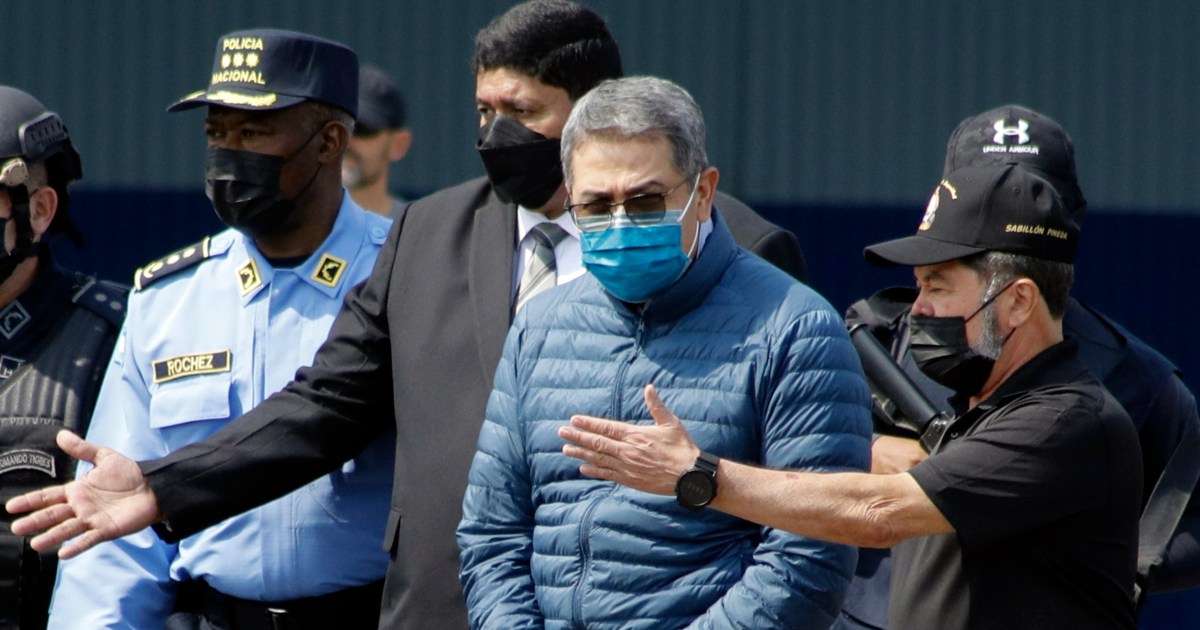On Friday, March 8, former Honduran President Juan Orlando Hernández was convicted on three counts of drug trafficking and weapons conspiracy in a Manhattan federal court. Extradited to the United States shortly after completing his second presidential term in 2022, the 55-year-old Hernández is up against a mandatory minimum sentence of 40 years in jail.
Following the conviction, US Attorney General Merrick Garland accused Hernández of having run Honduras as a “narco-state where violent drug traffickers were allowed to operate with virtual impunity”. The US Department of Justice, Garland righteously bleated, has now shown its commitment to “disrupting the entire ecosystem of drug trafficking networks that harm the American people, no matter how far or how high we must go”.
And yet given the United States’ fundamental role in nurturing and sustaining this very ecosystem in the first place, the guilty verdict can safely be filed under the “Can’t Make This Up” category of imperial hypocrisy.
For starters, recall that Hernández was until very recently a good chum of successive US administrations, which appointed him a vital ally in the so-called “war on drugs” and flung money at Honduras accordingly. The messianically right-wing leader came to power five years after the 2009 US-facilitated coup d’état against Manuel Zelaya, who had dared to steer the country slightly off the straight and narrow path of neoliberal dystopia.
The fabricated pretext for the coup, which took place on US President Barack Obama’s watch, was that Zelaya was scheming to remain president of Honduras in violation of the constitutional one-term limit. Later this limit was quickly dispensed with in order to enable the continued reign of Hernández, whose re-election in 2017 was recognised by the US Donald Trump administration despite sweeping allegations of fraud.
Post-election protests triggered a characteristically lethal response from Honduran security forces, which didn’t stop the US from continuing to fund those very same forces. Anyway, it was business as usual in a Central American nation that the US has historically viewed as its own personal military base.
During the Cold War, for example, the US utilised Honduras as a launchpad for terrorising neighbouring Nicaragua, which had failed to properly submit to the charitable chokehold of US-imposed capitalism.
And what do you know: contributing to the war effort in Nicaragua was none other than prominent Honduran drug lord Juan Ramon Matta Ballesteros, whose airline SETCO – which helped supply US-trained Contra mercenaries – was known as the “CIA airline”. Meanwhile, the drug trade the Contras were reaping profits from helped kick off a crack cocaine epidemic in South Central Los Angeles.
How’s that for “ecosystems that harm the American people”?
To be sure, long-standing US involvement in drug trafficking is hardly a secret; as a New York Times headline from 1993 specified: “The CIA Drug Connection Is as Old as the Agency”. The CIA’s narco-operations have spanned the globe from Pakistan to Laos to Venezuela, while many an international narco-politician has – like Hernández – found at least fleeting favour with the US government.
Take the case of Hernández’s fellow Central American leader Manuel Noriega, the late drug-running dictator of Panama, whose service as a CIA asset and US pal persisted for decades until one fine day in 1990, when he was hauled off to Miami to face drug trafficking and other charges. In 1992, he was sentenced to 40 years in prison – the same sentence now looming over Hernández.
During the prelude to Noriega’s extradition, the US military bombed the living daylights out of the impoverished neighbourhood of El Chorrillo in the Panamanian capital of Panama City, killing up to several thousand civilians. The neighbourhood was temporarily nicknamed “Little Hiroshima”; the US dubbed the slaughter “Operation Just Cause”.
Objectively speaking, of course, the US was in no position to impose “justice” in Panama – and the current Hernández drug trial is not really a “just cause,” either. At the end of the day, the United States’ erstwhile Honduran narco-buddy is merely a symptom of a US-fuelled ecosystem, not its cause.
Moreover, the justice system of a global superpower that is essentially responsible for institutionalising impunity in the Honduran postcoup era cannot be credited with bringing any sort of justice to Honduras.
As scholar Dana Frank documents in her book The Long Honduran Night: Resistance, Terror, and the United States in the Aftermath of the Coup, US “drug war” funds went to support the homicidal activities of security guards working for biofuels magnate Miguel Facusse in the Aguan Valley in northeastern Honduras, where small farmers seeking to assert their land rights were being “hunted down… like animals”.
According to WikiLeaks cables, the US had known since at least 2004 that Facusse was trafficking in cocaine. Frank summarises the vile verdict: “Precisely as US funding for the Honduran military and police escalated under the pretext of fighting the drug war, then, US-supported troops were conducting joint operations with the security guards of someone the United States knew was a drug trafficker, in order to violently repress a campesino movement on behalf of his illegal claims to vast swaths of the Aguan Valley.”
Returning to US Attorney General Garland’s allegations regarding the “narco-state where violent drug traffickers were allowed to operate with virtual impunity”, it is rather painfully obvious that said state of affairs is 100 percent made in the USA – the country whose demand for and criminalisation of drugs is also what drives the whole narco-enterprise.
In the end, if the US really wants to go about “disrupting the entire ecosystem of drug trafficking networks”, it needs to disrupt itself first.
The views expressed in this article are the author’s own and do not necessarily reflect Al Jazeera’s editorial stance.
Check out our Latest News and Follow us at Facebook
Original Source

